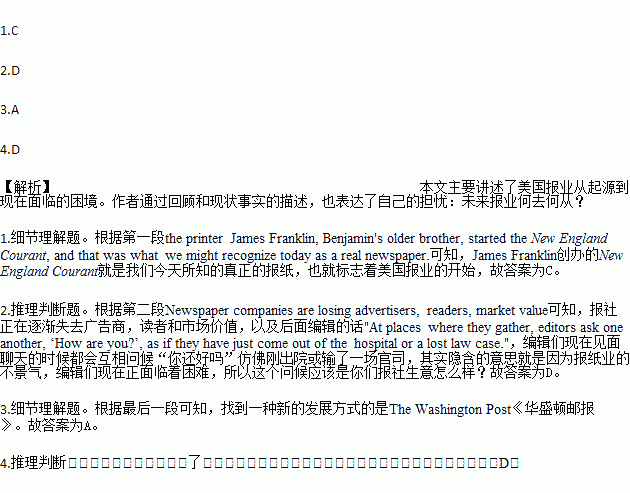题目内容
The American newspaper has been around for about three hundred years. In 1721, the printer James Franklin, Benjamin's older brother, started the New England Courant, and that was what we might recognize today as a real newspaper. He filled his paper with stories of adventure, articles on art, on famous people, and on all sorts of political subjects.
Three centuries after the appearance of Franklin's Courant, few believe that newspapers in their present printed form will remain alive for long. Newspaper companies are losing advertisers, readers, market value, and in some cases, their sense of purpose at a speed that would not have been imaginable just several years ago. The chief editor of the Times said recently, "At places where they gather, editors ask one another, ‘How are you?’, as if they have just come out of the hospital or a lost law case." An article about the newspaper appeared on the website of the Guardian, under the headline "NOT DEAD YET."
Perhaps not, but the rise of the Internet, which has made the daily newspaper look slow and out of step with the world, has brought about a real sense of death. Some American newspapers have lost 42% of their market value in the past three years. The New York Times Company has seen its stock (股票) drop by 54% since the end of 2004, with much of the loss coming in the past year. A manager at Deutsche Bank suggested that stock - holders sell off their Times stock.
The Washington Post Company has prevented the trouble only by changing part of its business to education; its testing and test-preparation service now brings in at least half the company's income.
1.What can we learn about the New England Courant?
A. It is mainly about the stock market.
B. It carries articles by political leaders.
C. It marks the beginning of newspapers.
D. It remains a successful newspaper in America.
2.What can we infer about the newspaper editors?
A. They often accept readers' suggestions.
B. They care a lot about each other's health.
C. They stop doing business with advertisers.
D. They face great difficulties in their business.
3.Which of the following found a new way for its development?
A. The Washington Post. B. The Guardian.
C. The New York Times. D. New England Courant.
4.How does the author seem to feel about the future of newspapers?
A. Satisfied. B. Hopeful. C. Surprised. D. Worried.
 孟建平错题本系列答案
孟建平错题本系列答案 超能学典应用题题卡系列答案
超能学典应用题题卡系列答案
